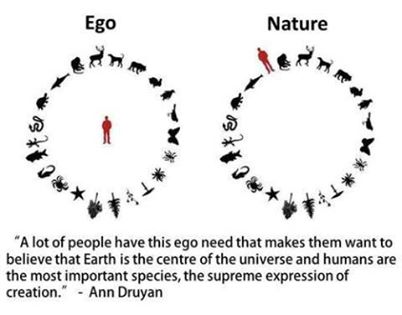Anthropocentrism
Anthropocentrism, an-thro-po'sen-tri-zm, n.
Anthropocentrism describes the tendency for human beings to regard themselves as the central and most significant entities in the universe, or the assessment of reality through an exclusively human perspective.
The term can be used interchangeably with humanocentrism, while the first concept can also be referred to as human supremacy. The views are especially associated with certain religious cultures. Anthropocentrism is a major concept in the field of environmental ethics and environmental philosophy, where it is often considered to be the root cause of problems created by human interaction with the environment.
"Humankind's greatest sin is anthropocentrism - where human life is valued above all other sentient life. Msirtnecoporhtna - backwards or forwards it makes no sense. If Moses could spell it, he would have put in his top 10."

New quote in 30 seconds